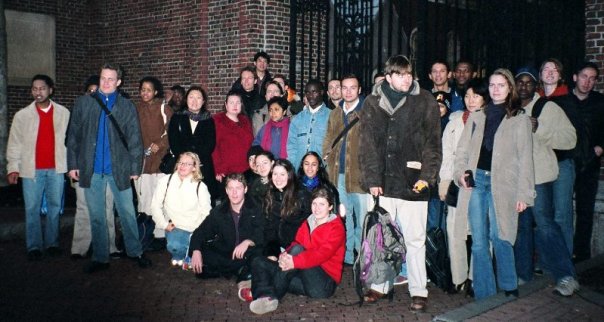
Alumni Spotlight: Amos Jones ’03 and the I-House Experience
When Amos N. Jones moved into International House in the fall of 2002, he was not fully prepared for what he was about to experience.
Jones, now a Washington, DC-based attorney who practices, lectures and publishes in the areas of civil rights, religious freedom and ethics, chose I-House as his residence while pursuing his Masters in Journalism from Columbia University. This was after the Kentucky-born National Merit Scholar graduated cum laude from Emory University, but prior to studying at Harvard Law and on a Fulbright Scholarship to the University of Melbourne in Australia.
“I had not studied abroad, but abroad came to me at I-House,” says Jones. “Part of the genius of the place is that you have people mostly the same age, pursuing higher education and prestigious internships, similarly wired and prepared – but approaching things from entirely different cultures. With that variable isolated, the learning is unmistakable.”
Jones relishes the memories of those “pre-Tik Tok” days where everyone had to talk to one another in the spacious public rooms at the House, which he likens, with intentional irony, to a “great intellectual country club.”
Amos Jones, at left, with fellow residents Itai Maytal, Melinda Agyekum, Albert Pulido, and Muriel Kalifa in Times Square, NYC, 2003
An especially memorable turn of events occurred early in Jones’ residency, when he ran for election to the I-House Residents Council and tied for second place. Along with the other second-place winner, Daniel Levy ’04, he became a Resident Trustee. The winner of the most votes for Council President was Maren Westphal of Germany, who was pursuing her PhD in Clinical Psychology at Columbia University Teacher’s College.
Soon, the journalism student from Kentucky and the psychology student from Germany discovered they had much in common. They were both the children of pastors: hers, a Lutheran whose faith and pastoral ministry was inspired by the Confessing Church, a German Protestant movement defined by its resistance to oppression, and his, an African-American in the Progressive National Baptist Convention associated originally with the Rev. Martin Luther King Jr. As Jones and Westphal worked through issues of representation in the House and beyond, they found a common bond through the martyred German theologian Dietrich Bonhoeffer, who was an I-House member while studying at Union Theological Seminary in the early 1930s.
Jones hails from a storied family of clergy active in the Civil Rights movement in the US, while Westphal’s parents named her brother Dietrich after Bonhoeffer, whose writings exemplified Zivilcourage (moral courage) during the Nazi regime. When Westphal’s father visited New York, he, Westphal, and Jones attended a service at Abyssinian Baptist Church in Harlem with I-House residents. Bonhoeffer had taught Sunday school and Bible study in that church, and later shared African American spirituals with German students at his dissident seminary at Finkenwalde to augment his theological lessons, before being captured and executed in a concentration camp in 1945.
Jones and Westphal remained friends, and last year Westphal, an Associate Professor of Psychology at Pace University, invited Jones, an Adjunct Professor of First Amendment Law at Trinity Washington University, to guest lecture via Zoom to one of her classes about his experiences as an African American in academic and legal settings.
Reflecting on the long-term impact of his residency at I-House, Jones says, “I-House was the most transformative moment in my entire life, in terms of intellectual development, even my personality, precisely because I’m a Black person in the US.”
“Sitting in the Dining Room, I was looking at people like the ones I’d gone to school with all my life, but who had no bias regarding my thinking or ideas on account of my color,” he says. “They fostered no defensive reactions to controversial ideas that would have shut down the dialogue, and with it, the possibility of true friendship.”
Jones found this aspect of life at I-House particularly refreshing, and he has forged his own path and worldview. While an Academic Visitor on the Faculty of Law at the University of Oxford, he developed a heuristic approach to global concerns of corporate responsibility and diversity that shapes policies and practices determined to be “realistic and effective, rather than politically correct and impotent.”
A labor-and-employment litigator leading a national practice, Jones is busy these days, representing among other clients candle factory workers in Mayfield, KY, who were told they would be fired if they left work ahead of the deadly tornadoes that swept through the area on December 10, 2021, killing nine of the 110 employees there that night.

He keeps in touch with numerous fellow I-House alumni, including Westphal and Shirley Smith ’70, with whom he became close friends, and has participated in alumni events. He even hosted a group of visiting I-House residents in Cambridge, MA, in 2003 when he was in law school.
Hosting I-House residents at Johnson Gate, Harvard Yard, 2003
Most recently, Jones was eager to pitch in when he heard about the plans at I-House for the upcoming Donald L. Cuneo Hall of History. Recalling his work as a Resident Trustee with the late I-House President Don Cuneo, Jones recalls Cuneo as an inspiring leader who went out of his way to help any I-House resident or alumnus he could.
“In obvious and delightful ways, Don’s relentless commitment to client service–which I’m sure made him one of the finest international lawyers–translated directly into his commitment to our beloved community,” Jones says.
“That’s why I’m so glad his memory will live on through the newly re-named Hall of History. From generation to generation, the vision of the founders of I-House proves itself prescient, and Don’s brilliant legacy is now permanently in that pantheon.”
(All photos courtesy of Amos Jones)